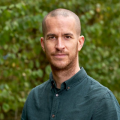Climate Activists Mark President Ajay Banga’s Bullish First Year at the World Bank
Activists placed a cutout of the Wall Street bull outside the World Bank Group office in Washington, D.C. to mark the delivery of petition signatures and a group letter asking President Ajay Banga to oust Wall Street influencers by abolishing his newly-created advisory body, the Private Sector Investment Lab.
Friends of the Earth U.S. and partners marked Ajay Banga’s first year as president of the World Bank Group by exposing the Wall Street ties that are stymieing climate action at the financial institution. After years of following a private-sector-first approach to development, the World Bank Group faces growing pressure from civil society groups around the world to stop subsidizing private financiers under the guise of climate action, and to instead help facilitate massive public investment in a global just energy transition.
The Private Sector Investment Lab is a “who’s who” of leaders of major financial institutions that collectively manage an estimated wealth of USD $16 trillion. These institutions are largely responsible for continuing to profit from climate destruction and associated environmental and social abuses.
The creation of this Lab was one of Banga’s first actions after shareholders asked the Bank to better position itself to address “global challenges” like climate change. The Lab was tasked with “[developing] solutions to address the barriers to private sector investment in emerging markets,” particularly by increasing private finance going to renewables and energy infrastructure.
Yet limited public finance from the World Bank Group should not be used to subsidize profitable private firms, which constitutes an unacceptable conflict of interest. Through Banga’s Lab structure, private firms may suggest that the World Bank Group adopt policies that can benefit companies instead of prioritizing the Bank’s mission of ending poverty and inequality and safeguarding the planet.
In the letter, Friends of the Earth and partners calls on Banga to “use the Bank’s existing resources and structures to support thinking and policies on how to facilitate massive public investment in the green energy transition.” The letter closes by asking Banga – a former MasterCard CEO with no public service experience – who he works for, “the world’s poorest people, or Wall Street?”
Groups issued the following statements:
“It’s no mystery why we’re failing to see climate justice at the World Bank Group when polluting profiteers are the ones whispering in Banga’s ear,” said Luisa Abbott Galvao, senior international policy campaigner for Friends of the Earth U.S. “The World Bank and its major shareholders have long pushed the failed approach of de-risking private finance for development, and President Banga has put this idea on steroids. The WBG should be directing limited public money towards a public-led global energy transition, instead of devising strategies to line Wall Street pockets.”
“The World Bank should use resources to strengthen a transition to climate justice, in a way that benefits vulnerable people who for decades have experienced the impacts of climate change and lost their territories,” Adrian Martinez, Director of La Ruta del Clima.
“The World Bank should be listening to the Indigenous Peoples and other communities on the ground who are facing the worst impacts of the climate crisis and can propose real solutions - not to those causing and profiting from the crisis,” Prabindra Shakya, Convenor of the Asia Indigenous Peoples Network on Extractive Industries and Energy (AIPNEE).
“PSIL deepens the taxpayer-supported World Bank Group’s ties with deep fossil fuel pockets – private bank and equity fund titans. Thus PSIL reflects WBG hypocrisy: While the WBG boasts being the largest multilateral clean energy financier it remains the biggest multilateral fossil fuel investor. Relying on PSIL advice also deepens the WBG’s ever-deepening private corporate bias. It reflects how transnational corporations are the real WBG beneficiaries rather than the world’s destitute people whom the WBG mission promises to deliver out of poverty.” Elaine Zuckerman, Gender Action President
Johan Frijns, Executive Director of BankTrack said: “It is shocking to see that the World Bank seeks advice from Wall Street on what it should focus on. Rather than asking the CEOs of the world’s largest banks for advice, the World Bank should seek to be the bank that instructs those banks where and how to invest for the true benefit of humanity and the planet. Some of the banks on this advisory board continue to pour billions into ongoing fossil fuel exploration and extraction, showing that they have learned nothing from thirty years of ongoing climate crisis, let alone that their wilfully ignorant CEOs are in a position to advise others on what to do.”
"Marking Ajay Banga's first year in office, we challenge the World Bank Group to acknowledge private financiers' role in climate destruction and shake off their influence. The Private Sector Investment Lab, dominated by Wall Street top brass, represents a conflict of interest that undermines genuine climate action. We call on the World Bank to redirect its efforts from subsidizing profitable private firms to facilitating public investment in a global just energy transition. It is time for the World Bank to prioritize the needs of the poorest over the special interests of the wealthiest." Dustin Schaefer, Team Lead for Multilateral Financial Institutions, Urgewald.
“You can’t rely on the pyromaniac to stop the fire. The World Bank should urgently replace this investment lab with a taxation lab that will ensure that those responsible for the climate crisis contribute to the public resources that governments and citizens need to address it.” Frédéric Mousseau, Policy Director, The Oakland Institute
María José Romero, Policy and Advocacy Manager at the European Network on Debt and Development (Eurodad) said: "The Bank's new climate-oriented vision statement, championed by President Banga, will not deliver climate justice outcomes while its modus operandi remains the private-finance-first approach to development. This approach has failed to provide the “trillions” in development finance promised many years ago, and instead risks deepening the existing structural inequalities that helped to cause the development and climate crises. By prioritising market-based solutions for climate action the World Bank fails to acknowledge the responsibility of the global north to tackle climate change and fulfill their climate finance commitments to the global south. What is needed is a fundamental rethink of how the institution goes about achieving its mission and vision."
Kontakt

Dr. Dustin Schäfer
Team Lead Campaigns Multilateral Financial Institutions
dustin [at] urgewald.org

Dr. Ognyan Seizov
International Communications Director
ognyan.seizov [at] urgewald.org
+49 (0)30 863 2922-61